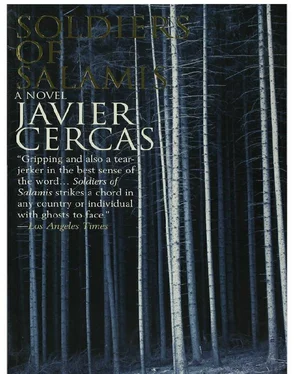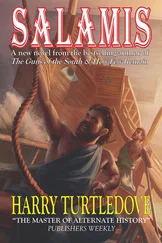'Are you sure I said all that about heroes?'
'Word for word,' I answered, suddenly suspicious, thinking the initial praise was just a preamble to the reproaches, and that Bolaño was one of those loquacious interviewees who attribute all their verbal indiscretions to journalists' spite, negligence or frivolity. 'I've got it on tape.'
'No shit! Well, it sounded pretty good!' he reassured me. apos;But I called you about something else. I'm going to be in Gerona tomorrow, I have to renew my residency permit a fucking nuisance, but it won't take me very long. Do you want to meet for lunch?'
I hadn't expected the call or the suggestion and, perhaps because it seemed easier to accept than make up an excuse, I accepted, and the next day, when I arrived at the Bistrot, Bolaño was already sitting at a table with a Diet Coke in hand.
'It's been at least twenty years since I've been here,' remarked Bolaño, who on the phone the previous day had told me that, when he used to live in the city, his place was near the Bistrot. 'This has changed a fuck of a lot.'
After having ordered (steak and salad for him; steamed mussels and rabbit for me), Bolaño repeated his praise for my interview, he talked about Capote and Mailer, then asked me suddenly if I was writing anything. Since nothing annoys a writer who doesn't write as much as being asked what he's writing, I answered, slightly irritated:
'No.' And because I figured for Bolaño, like for everyone, writing for a newspaper wasn't really writing, I added: 'I don't write novels any more.' I thought of Conchi and said: 'I've discovered I have no imagination.'
'To write novels you don't need an imagination,' Bolaño said. 'Just a memory. Novels are written by combining recollections.'
'Then I've run out of memories.' Trying to be witty I explained: 'I'm a journalist now: a man of action.'
'Well, that's a shame,' said Bolaño, 'a man of action is a frustrated writer. If Don Quixote had written one single book of chivalry he never would have been Don Quixote, and if I hadn't learned how to write I'd be firing away with the FARC right now. Besides, a real writer never stops being a writer. Even if they don't write.'
'What makes you think I'm a real writer?'
'You wrote two real books.'
'Juvenilia.'
'The newspaper doesn't count?'
'It counts. But I don't write for pleasure there: just to make a living. Besides, a journalist isn't the same thing as a writer.'
'You're right there,' he conceded. 'A good journalist is always a good writer, but a good writer is almost never a good journalist.'
I laughed.
'Dazzling, but false,' I said.
While we ate, Bolaño told me about when he'd lived in Gerona; he described minutely an interminable February night in one of the city's hospitals, the Josép Trueta. That morning they'd diagnosed him with pancreatitis and when the doctor finally appeared in his room, he asked him, knowing what the answer would be, if he was going to die; the doctor stroked his arm and told him no in the voice they always reserve for lies. Before falling asleep that night, Bolaño felt profoundly sad, not because he knew he was going to die, but for all the books he'd planned to write and would now never write, for all his dead friends, all the young Latin Americans of his generation — soldiers killed in wars already lost — he'd always dreamt of resuscitating in his novels and who'd now stay dead forever, just like him, as if he'd never existed; then he fell asleep and during the night dreamt he was in a ring fighting a sumo wrestler, a gigantic and smiling Oriental against whom he could do nothing and against whom, nevertheless, he kept fighting all night long until he woke up and knew, before anyone told him, with a superhuman joy he'd never felt since, that he wasn't going to die.
'But sometimes I think I still haven't woken up,' Bolaño said wiping his mouth with his serviette. 'Sometimes I think I'm still in that bed in the Trueta, fighting that sumo wrestler, and everything that's happened over these years (my son and my wife and the novels I've written and my dead friends I've talked about) is what I've dreamed, and at some moment I'll wake up and I'll be on the canvas in the ring, murdered by a big fat Oriental guy who smiles just like death.'
After lunch Bolaño asked me to go for a walk with him around the city. I went with him: we walked through the old part of the city, down the Rambla, across the Plaza de Catalunya, through the market-place. At dusk we went to have a drink in the bar of the Hotel Carlemany, quite near the station, while Bolaño waited for his train. It was there, between cups of tea and gin and tonics, that he told me the story of Miralles. I don't remember why or how he got to it; I remember he talked with an unwavering enthusiasm, with a sort of jubilant seriousness, putting all his military and historical erudition at the service of the tale, which was overwhelming but not always precisely accurate, because later when I consulted several books on the military operations of the Civil War and the Second World War, I discovered that some of the dates and names and circumstances had been modified by his imagination or his memory. Yet for the most part, the tale not only seems true, but is also, in most of its details, verifiable.
Once the few facts and dates Bolaño had altered have been corrected, the story goes like this:
Bolaño met Miralles in the summer of 1978, in the Estrella de Mar campsite, in Castelldefells. The Estrella de Mar was a caravan site where a floating population, comprised basically of members of the European proletariat, would show up each summer: French, English, Dutch, Germans, the odd Spaniard. Bolaño remembered that, at least during the time he spent there, those people were very happy; he also remembered that he, too, was happy. He worked at the campsite for four summers, from 1978 to 1981, sometimes on weekends in the winters too; he worked as rubbish collector, night watchman, everything.
'It was my doctorate,' Bolaño assured me. 'I got to know such a range of human fauna. Actually, never in my life have I learned so many things, so quickly, as I did there.'
Miralles arrived every year at the beginning of August. Bolaño remembered him driving up with his caravan, with his exuberant greetings, his huge smile, his cap pulled down over his brow and his enormous buddha's belly, registering at the office and setting up immediately at his assigned site. From that moment on Miralles never wore more than swimming trunks and a pair of flip-flops for the rest of the month and, since he walked around undressed all day, he attracted attention from the start because his body was a real compendium of scars. In fact, his whole left side, from his ankle all the way up to his eye, out of which he could still see, was one entire scar. Miralles was Catalan, from Barcelona or near Barcelona — Sabadell maybe, or Terrassa: in any case Bolaño remembered having heard him speak Catalan but he'd been living in France for years and, according to Bolaño, he'd become completely French: he wielded a sharp sense of irony, ate and drank well and loved good wine. In the evenings he'd get together with his old campsite friends from every summer in the bar and Bolaño, as night watchman, would often join these sessions that went on far into the night; he saw Miralles get drunk on many occasions, but he never saw him turn aggressive or rowdy or sentimental. At the end of such nights he simply needed someone to take him back to his caravan, because he couldn't get there by himself. Bolaño helped him many times, and also sat up late with him in the bar, drinking on their own long after Miralles had outlasted all his mates, and it was during these interminable solitary nights (he never saw him talk about it in front of others) that he listened to him unfurl his war record — unfurl it without boasting, without pride, with the learned irony of an adoptive Frenchman, as if it didn't belong to him but to some other person, someone he barely knew but whom he vaguely respected. That's why Bolaño remembered his tale with absolute precision.
Читать дальше












